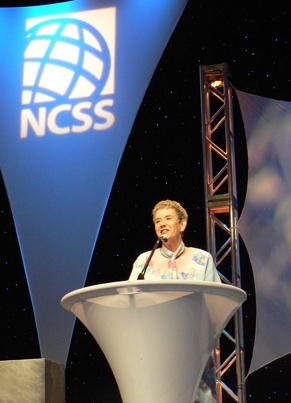About NCSS
Founded in 1921, the National Council for the Social Studies has grown into the largest association in the country for social studies professionals, with 25,000 members in all 50 states, the District of Columbia, and 69 other countries. Membership includes K-12 classroom teachers, curriculum supervisors and specialists, curriculum writers and designers, and teacher educators. The NCSS serves as an umbrella organization for K-12 teachers of civics, history, geography, economics, political science, sociology, psychology, anthropology, and law-related education. Social studies is the integrated study of the social sciences and humanities to promote civic competence. Visit the NCSS website for more information.
About the 2007 NCSS Conference

The 87th annual conference of the National Council for the Social Studies was held November 30 to December 2, 2007 in San Diego, California. More than 4,000 teachers, teacher educators, researchers, and school officials gathered for the conference at the San Diego Convention Center. The conference featured more than 500 professional development sessions, governance activities, informal networking and social events. The conference theme, "Crossing Borders—Building Bridges,” reflected the organization's commitment to provide youth with the content knowledge, intellectual skills and civic values necessary to prepare them to understand and address critical cultural, economic, geographic, historic and political issues in our society.
My presidential speech focused on five challenges we face as social studies educators: responding to the global age by helping our students understand and address global issues; creating a powerful and authentic socials studies curriculum; teaching our students to use multiple technologies as tools for learning, communication, and participation; working more effectively with linguistically and culturally diverse learners, students in poverty, and others with special needs; and becoming advocates for ourselves as educators and for the students we teach. Working together, crossing borders and building bridges, we can achieve these goals. Click here to read the full text of my speech, "Crossing Borders-Building Bridges."
Featured speakers included: recently retired Supreme Court Justice Sandra Day O’Connor, who addressed participants on the civic mission of schools; Cambodian American human rights activist and 2007 NCSS Spirit of America Award winner, Loung Ung, who discussed issues of human rights and social justice within the context of her life and work; technology and education innovator , Jamie McKenzie, who focused on the smart use of new technologies in the classroom; senior vice president for Academic Learning and former president of the University of Phoenix, J. Jorge Klor de Alva, who discussed the impact of globalization on education; founder of the Institute for Development Studies and Practices in Pakistan, Quaratulain Bakhteari, who highlighted the development of educational and social-environmental policies in Pakistan.
In addition, the conference program offered several special sessions and panels on a variety of topics such as advocacy, human rights, migration, language and literacy, effective instructional strategies and diverse learners, including “What Effective Urban Educators Need to Know and Be Able To Do,” “Making Social Studies Culturally Responsive to Ethnically, Culturally and Racially Diverse Students,” “Immigration Policy: Where is the Common Ground?” “The United States-Mexico Border Region,” “Environmental Citizenship: Implications for Teaching and Learning,” and “Promising Practices for Revitalizing Elementary Social Studies.”
Links to Presidential Columns in The Social Studies Professional
- September: "Make Every Moment Count"
- October 2007: "Preparing 21st Century Teachers"
- November 2007: "Creating Effective Citizens"
- January 2008: "Learning from our Diversity"